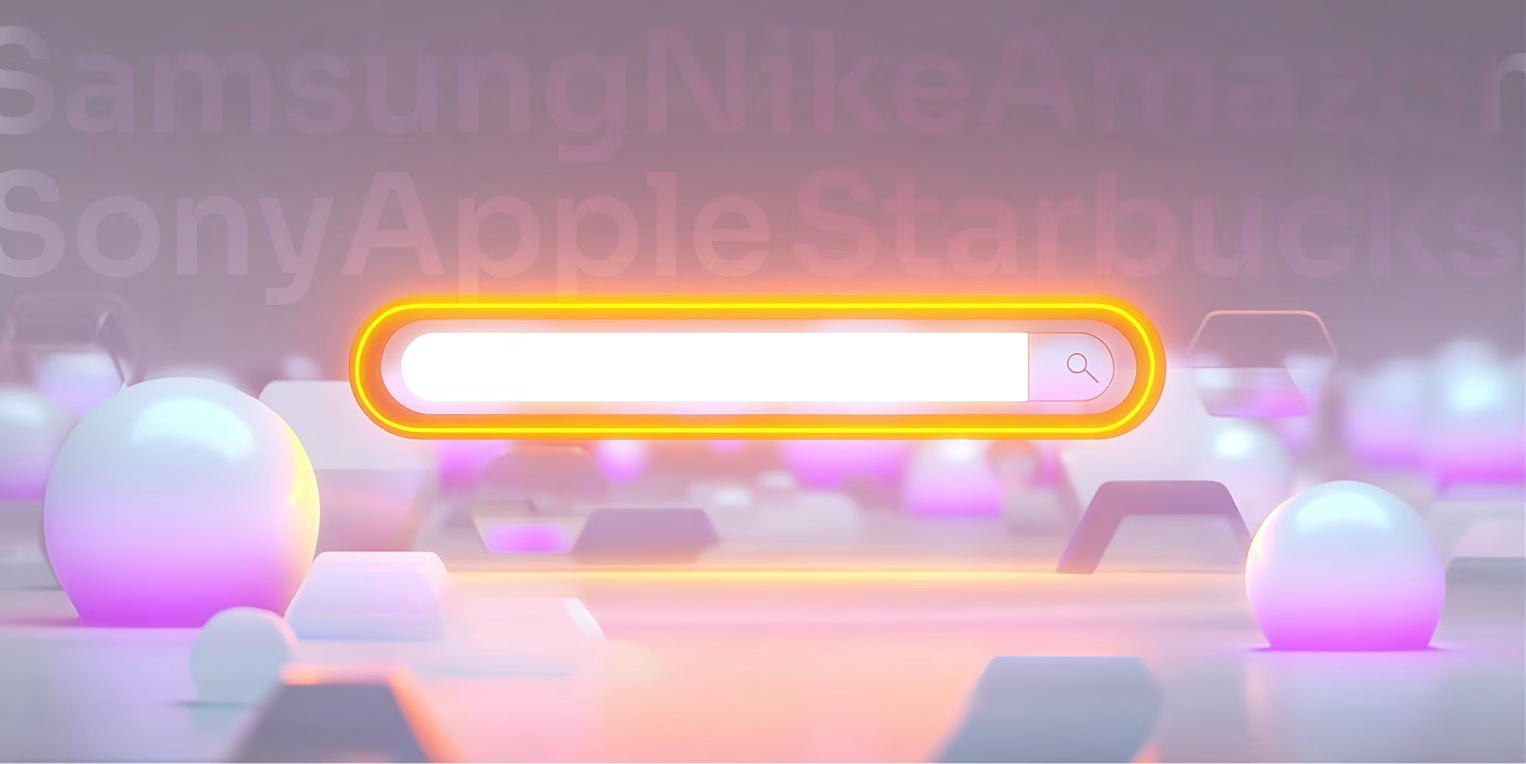
Search behavior is shifting fast, and the rise of AI-powered search engines has pushed that shift into overdrive.
In the world of generative search, trust matters more than ever. In this environment, branded queries, searches that include your company or product name, are emerging as one of the strongest signals of authority, trust, and visibility.
For business owners, marketers, and SEO professionals, branded searches reveal who controls mindshare and who is at risk of being invisible at the very moment decisions are made. Visibility here depends on more than keywords. It’s about recognition, reputation, and a consistent presence across the web.
This article unpacks what branded queries are, why they matter more than ever and how to track and grow them strategically.
What Are Branded Queries

At the simplest level, branded queries are searches where a brand name appears alongside a product, service, or keyword. The difference from non-branded queries is what makes them so powerful.
Picture two people at the same point in their buying journey. One searches for “best running shoes”, the other types “Nike running shoes”. The first is open to persuasion, the second has already made up their mind. That second search tells you everything about brand power.
This makes branded queries a high-intent signal. Users aren’t browsing – they’re seeking you out. As Jenny Abouobaia puts it: “When someone types your name into Google, it means one of two things: they already know who you are (1) or they’re seriously considering you (2).”
Google also treats branded queries differently. They serve as proof of recognition and trust, two factors that search engines are built to reward. A consistent volume of branded searches signals to Google that your brand matters to users, which in turn influences ranking stability and domain authority.
A study by Rand Fishkin published on Sparktoro reveals that 44.19% of Google searches are for brands, underscoring just how central branded intent has become in the way people search online.
Non-branded Search vs. Branded Search
Non-branded search is where discovery happens. It’s the moment someone types “top project management tools” and encounters your brand for the first time. Branded search, by contrast, is where the decision crystallizes – think “Asana pricing.” One signals awareness, the other intent.
Crucially, these two types of searches are interdependent. You don’t earn branded queries without deliberate non-branded marketing: content, PR, social media, partnerships – all the stuff contributing to recognition. Branded traffic is driven by that awareness-building groundwork.
A recent analysis by Metrics Watch highlights the balance: while branded traffic converts two to three times more effectively, non-branded search still drives the majority of volume, building awareness and broadening reach. That means non-branded SEO still plays a vital role by pulling in top-of-funnel traffic, but it’s branded queries that close the loop.
Why Branded Queries Matter: Authority, Trust & Psychology

Branded queries go beyond visibility – they represent preference. When someone types your name into the search bar, they’ve already chosen to consider you over countless alternatives. That act alone signals brand awareness at scale and serves as one of the clearest markers of trust for both users and search engines.
Brand Awareness and Intent
A branded query shows that a user already knows your brand exists and is curious enough to look for it directly. That’s not just a casual action – it’s an expression of intent. In many cases, that’s half the conversion journey already covered, with the remaining half often requiring far less persuasion. It’s evidence that brand recognition translates into measurable demand.
The Psychology of Familiarity
Human decision-making is deeply influenced by trust. When money, time, or personal data is at stake, people lean toward what feels familiar. Consider this statistic: 81% of consumers say they need to trust a brand before purchasing. Recognized names inspire confidence, while unknown options introduce uncertainty. Branded queries capture that instinctive bias. They transform comfort and recognition into a tangible competitive advantage, turning familiarity into preference at the exact moment of decision.
The New Search Landscape
Search is no longer just a list of blue links. With generative AI and LLMs (Large Language Models), the results page is being rewritten in real time. Instead of directing users to ten possible destinations, AI-powered systems increasingly deliver synthesized answers, complete with citations.
Brand Authority Determines Visibility in AI-Search
When AI is tasked with summarizing content, it doesn’t surface content at random. It relies on brand signals, favoring sources that are established and trusted.
Brands that are frequently searched, cited, and mentioned have a far greater chance of being included in AI-generated answers. In other words, if users don’t actively search for and talk about your brand, AI is less likely to surface you as a credible answer.
Ahrefs’ study of 75,000 brands, points to the same conclusion: branded search volume is one of the strongest predictors of AI chatbot mentions.
Zero-clicks: Fewer Clicks Put More Weight on Brands
At the same time, Google’s AI Overviews, featured snippets, and knowledge panels are reducing the need for users to click through to a website at all. The result? Fewer opportunities to “win the click” and more reliance on brand familiarity.
If your name carries weight, users are more likely to trust the surface-level summary. If it doesn’t, you risk becoming invisible.
Familiar Brands Win in a Saturated SERP
Competition on the SERP has never been fiercer. Organic results are squeezed by ads, AI-generated overviews, and visual features, leaving less room for discovery. In this environment, branded queries act as the shortcut in a buyer’s decision-making process. When buyers are flooded with generic options, they default to what they already recognize.
Why AI Trusts Some Brands More Than Others

Google hasn’t revealed the full recipe behind AI Overviews, but early research shows a clear pattern: domains with strong authority and a history of trustworthy information are referenced far more often.
Authority isn’t built overnight – it’s earned through repeated mentions, expert-driven content, and backlinks from reputable sources. Together, these signals tell both humans and algorithms that your brand is reliable enough to be referenced.
Adapting to AI Search
When AI generates answers, it filters the web for sources it can trust. The psychology here mirrors human behaviour: when people face risk they instinctively lean on familiar names. AI does something similar.
If users aren’t actively searching for your brand, or if your name doesn’t appear frequently across credible platforms, AI has fewer signals to interpret you as a trustworthy source. This makes branded search demand and mentions essential for visibility in an AI-first search environment.
How Brand Mentions Influence AI Citations
LLMs are trained on massive amounts of publicly available content. If your brand consistently appears in articles, forums, and high-authority publications, the model learns to associate your name with relevance and reliability.
Over time, that repetition creates a compounding effect: the more your brand is cited, the more likely AI systems are to surface you in future answers. That consistency is what pushes a brand into AI answers. Visibility is no longer about holding the #1 spot – it’s about being known, trusted, and cited.
Google’s Helpful Content Update Reinforces This
Google’s Helpful Content system was designed to elevate original, people-first material written by those with real experience. Generative AI is moving in the same direction.
Both platforms aim to prioritise content that feels authentic and genuinely useful because that’s what people trust. Brands that deliver genuine value, rather than chasing quick SEO tricks, are the ones building long-term visibility in both search and AI results.
Branded Queries and SEO Performance
For years, SEO strategies revolved around non-branded keywords: ranking for “best CRM software” or “web design agency” was the holy grail. Those terms still carry weight, but in today’s AI-driven environment, branded queries have become the stabilizing force. They don’t just attract clicks – they make your search presence more resilient.
Higher Conversion Potential
Many researches confirm that branded keywords convert at significantly higher rates than generic terms because the searcher has already moved past early research. A user searching with branded intent is no longer window shopping – they’re standing at the checkout.
Correlation With Organic Rankings
For Google, branded search demand acts as a powerful trust signal. When more people search for a brand by name, it communicates legitimacy and credibility. In response, Google is more confident about surfacing that brand’s content across a wider range of queries. This is why growth in branded queries is often correlated with stronger domain authority and more resilient rankings.
There’s also a reinforcing loop at play: as branded search volume grows, non-branded rankings often improve. Brands with high recognition tend to secure top spots faster and hold them longer.
How Branded Searches Boost E-E-A-T
Branded queries tie directly into Google’s E-E-A-T framework: experience, expertise, authority, trustworthiness.
When users consistently search for your brand by name, it tells Google your site is a recognized authority. That branded intent amplifies credibility signals and supports better visibility across both informational and transactional queries.
Your Safety Net Against Algorithm Changes
Algorithm updates can shake up rankings overnight, but branded traffic acts as a buffer. A loyal base of users who type your name directly into the search bar ensures a steady flow of traffic, even when non-branded positions fluctuate.
Imagine a small SaaS company. Their blog ranks for dozens of generic terms, but traffic dips after a core update. Yet their branded search traffic stays steady, because customers type their name directly. That safety net keeps leads flowing while competitors scramble.
The Role of Branded Queries in Digital Marketing Strategy

Seasoned marketers and business leaders already know the value of brand equity. What has changed is the ability to measure branded queries, track their growth, and treat them as a KPI with the same weight as traffic, conversions, or revenue.
A Key Performance Indicator (KPI)
Branded search volume is now a metric that belongs on every dashboard. It doesn’t just show how many people are looking for you. It reveals how successful your broader efforts in PR, content, partnerships, and customer experience have been at cementing brand recall.
Rising branded demand signals that your marketing is working beyond clicks and impressions – it’s shaping mindshare.
Impact on Paid Advertising
Branded queries also transform paid campaigns. Ads triggered by your own brand terms consistently produce higher click-through rates (CTR) and lower cost per click (CPC) compared to generic keywords. These users already know who you are, so conversion paths are shorter and acquisition costs lower.
Smart advertisers often defend branded terms in paid search to block competitors and capture high-intent traffic at minimal expense.
The Social Media Effect on Brand Demand
Social platforms are where brand recognition often starts and branded queries are how that recognition shows up in search. A strong social presence drives conversations, hashtags, and mentions that later translate into direct brand searches on Google.
But, the reverse is also true: rising branded search demand provides a feedback loop for social strategy. If spikes in branded queries align with campaign launches, event sponsorships, or influencer collaborations, you know the message is resonating.
Practical Ways to Increase Branded Queries
Branded searches don’t grow by accident – they’re the outcome of consistent, deliberate effort across multiple touchpoints. If the goal is to drive long-term demand, every initiative should be aimed at making your brand not only recognizable but also memorable enough to be typed directly into the search bar.
Here are some practical strategies you can use to build stronger brand affinity and earn trust:
1. Consistency: The Shortcut to Recognition
Recognition starts with clarity and consistency. When tone, visuals, and messaging align across every channel, users trust the experience and algorithms reinforce authority. Strong branding creates recall, and recall creates branded searches.
2. Leverage PR and Thought Leadership
Earned visibility amplifies branded interest. Articles, expert commentary, and media features extend your reach beyond owned channels and validate authority in the eyes of your audience. Being cited or quoted on high-authority platforms generates curiosity that often turns into branded search activity.
3. Content Marketing With Purpose
Generic blog posts don’t fuel brand searches. What does? Case studies that demonstrate results, original research that brings fresh insights, and resources that competitors can’t replicate. Content that carries your unique expertise positions your brand as the definitive reference point in its category.
4. Social Media and Community Engagement
An active presence on LinkedIn and industry-specific forums keeps your brand top of mind. Engagement, not just posting, is the key to generating natural brand mentions. Direct interactions with your audience such as responding to comments, contributing to discussions, or leading conversations, build familiarity that naturally drives branded search volume.
5. Loyal Users as a Credibility Signal
An engaged, returning audience is one of the clearest signs that a brand delivers real value. Earning loyalty starts with delivering consistent value through products, services, and content that exceed expectations. Over time, these efforts turn casual visitors into advocates whose repeat behaviour strengthens both credibility and branded search demand.
6. Offline Tactics That Fuel Online Search
Brand recognition doesn’t happen exclusively online. Sponsoring industry events, hosting workshops, or speaking at conferences not only build authority in the room but also spark curiosity afterward – people head online to learn more.
How to Measure Branded Queries
The influence of branded queries isn’t theoretical – it shows up in the numbers.
A strong brand tracking dashboard should capture the signals that reflect how your brand is positioned in the market. These metrics put branded queries into context:
- Brand awareness: Are more people searching for your name over time?
- Perception and sentiment: Are mentions positive, negative, or neutral?
- Loyalty and advocacy: Do customers come back, recommend, or defend your brand online?
- Conversions and equity: Is branded traffic turning into revenue and long-term value?
Best Tools for Brand Tracking

Branded queries can be tracked with precision, but brand tracking requires the right mix of tools. Google Search Console (GSC), Google Analytics 4 (GA4), and Semrush provide insights into branded search demand, sentiment, and competitive benchmarks.
Here’s how to make the most of them:
- Google Search Console
The foundation of branded query tracking. It shows impressions, clicks, and average position for both branded and non-branded terms.
Actionable steps:
- Set up filters for branded vs. non-branded queries to see where demand is coming from.
- Monitor branded impressions quarterly to spot upward or downward trends.
- Pair branded query data with landing pages to identify which parts of your site attract the most brand-driven traffic.
- Google Analytics 4
GA4 connects branded traffic to outcomes. It helps you understand not just who searched for you, but what they did once they arrived.
Actionable steps:
- Create custom segments to isolate branded traffic and compare its conversion rates against non-branded.
- Track multi-channel funnels to see if branded searches are acting as the final touchpoint before a sale.
- Measure revenue attributed specifically to branded sessions.
This tool tracks mentions across the web and social media, offering sentiment analysis and competitive benchmarking.
Actionable steps:
- Set up alerts for new mentions so you can respond quickly.
- Track sentiment trends over time to understand how perception is shifting.
- Benchmark against competitors to see if your share of voice is growing.
Pro tip: Always segment branded from non-branded queries in reports. Without that split, it’s impossible to see whether performance is coming from genuine brand demand or from discovery efforts.
How to Make It Strategic
The most effective brand tracking programs treat branded queries as part of a bigger picture.
That means:
- Defining clear goals: Are you aiming to grow awareness, improve sentiment, or boost conversions?
- Choosing the right KPIs: Don’t track for the sake of tracking; pick what moves the business forward.
- Setting a rhythm: Quarterly reviews reveal long-term trends better than chasing week-to-week fluctuations.
- Comparing context: Benchmark branded performance against competitors to see if you’re gaining share of voice or losing ground.
Final Thoughts
Branded queries have moved from being a byproduct of awareness to the currency of trust.
The takeaway is clear: branded queries are now a cornerstone of digital success. Each search for your name signals that your brand is recognised, credible, and the preferred choice.
For marketers, business leaders, and SEO professionals, the task is clear: invest in building recognition that translates into branded demand. That’s why many companies partner with a branding agency to align messaging, identity, and digital presence, ensuring that awareness becomes measurable growth.
And ultimately, the brands that will win tomorrow are the ones people are already searching for today. The question is: when the search begins, will they be looking for you or for someone else?

